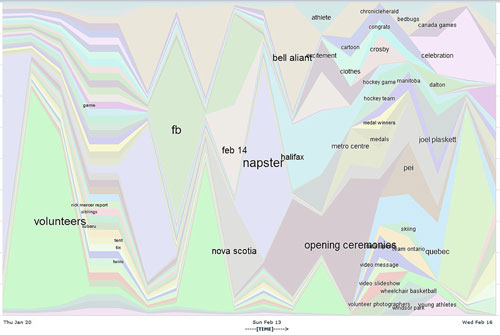
GRAND researcher and Dalhousie professor Dr. Gruzd’s social media research on the 2010 Winter Olympics studied the use and impact of Twitter during the event and how sentiments spread over online social networks. He is expanding his research to include another big sporting event, the 2011 Canada Games which are currently being held in Halifax, his home turf.
Preliminary analysis of the 2011 Canada Games shows that of the 4,000+ tweets with #2011canadagames hashtag, almost half are positive and only 3% of messages are negative, with the remaining messages being neutral in nature. These early results are consistent with the Olympic tweets from last year.
Regarding the Olympics tweets, Dr. Gruzd explained, "What we found is that even though most of the messages were neutral—informational, sharing photos or stories—if you just look at the messages that express emotion, there were three times more positive ones than negative. And they were three times more likely to be re-tweeted, on average."
Tweets from the 2011 Canada Games are currently being tracked. The games run from Feb 11-27, and after the event, all tweets will be analysed and final results posted.
"It will be interesting to see whether the distribution in favour of positive messages verses negative messages will continue to hold throughout the Games, but thus far, the comments being made are overwhelmingly very positive", said Dr. Gruzd.
In addition to tracking message tone, Dr. Gruzd and his team follow keyword popularity. The terms that are trending to the top of the list are "volunteers", specific corporate sponsors and media outlets, and what's happening in the art community.
The term ‘Volunteers’ and ‘vols’ (the short form for volunteers) are shaping up to be two of the most common keywords being used in tweets about the games. According to the event organizers, more than 5,000 people have registered to be volunteers, and undoubtedly some of the volunteers are also active Twitter users. It seems this is the most active private group of individuals tweeting about the winter games thus far. Their tweets focus on everything from congratulating groups of volunteers for organizing events, promoting upcoming activities, and messages of thanks between the volunteers themselves.
Another group that is getting a lot of buzz are corporate sponsors of the games and Canadian mass media outlets. They are actively following the games and tweeting about them. Their tweets are getting a significant amount of re-tweets (RTs) from readers. For example Bell Aliant and the Halifax’s The Chronicle Herald are the two biggest, however smaller more specialized news sources such as Synchro Canada are also competing to bring the Twitter audience coverage of this event.
A third area, the arts, are also featuring prominently in the Canada Games’ Twitterverse. The Halifax art community has a strong reputation which is perhaps why there is such an interest in this aspect of the Games. Artists selected for the National Artists Program (or ‘NAPsters’ as they have been dubbed in tweets) are being promoted. Special arts events such as the Joel Plaskett concert are frequently tweeted subjects.
The most re-tweeted topics to date on the 2011 Canada Games are mapped out in this graph.

Graph: Courtesy of A. Gruzd
To learn more about Dr. Gruzd and his team's research findings, read “Is Happiness Contagious Online? A Case of Twitter and the 2010 Winter Olympics”. Co-authored with Sophie Dorion and Philip Mai, it was recently presented at the 44th Annual Hawaii International Conference on System Sciences (HICSS).
You can also follow the Social Media Lab’s blog, where Dr. Gruzd is the director, and participate on the Social Media Lab’s Twitter feed.
Dr. Gruzd is one of more than 120 researchers with the GRAND Network of Centres of Excellence. He is currently involved with three GRAND projects DINS, where his social media research plays an integral part, MEOW and NAVEL.
His work has been featured in the The Chronicle Herald, Dalhousie News, uNews.ca and CBC radio.